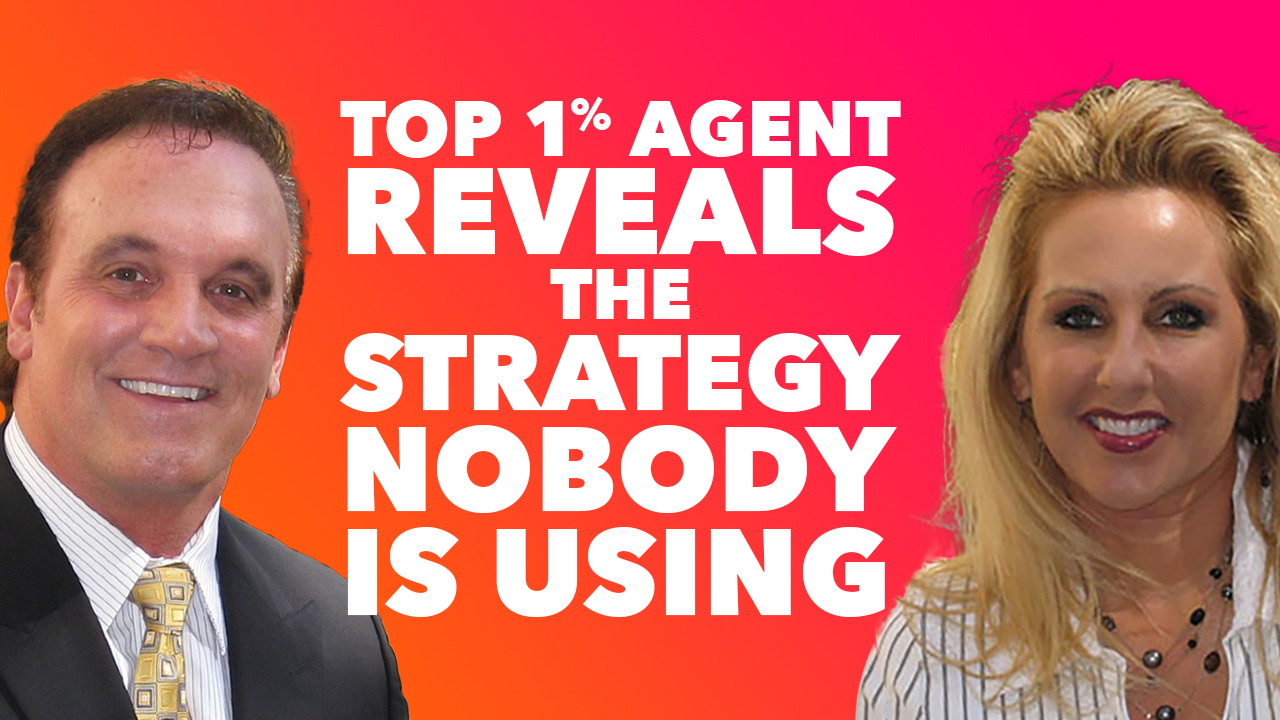In the minds of many bloggers (and perhaps in the minds of many marketers and agents as well), branding yourself as a real estate agent and branding your real estate business are the same thing, so they discuss the two ideas in the same way regardless of what their blog titles may imply.
These bloggers write about creating a name for your agency, selecting the right design and color for your logo, building a website, posting to social media, being consistent across all your collateral, running Facebook ads, and similar topics—all of which are important and necessary to branding a business.
But there is a significant difference between branding your real estate business and branding yourself as a real estate agent. The first is about creating representations of your brand; the second is about embodying that brand and what it stands for.
You are your brand
Branding defines your intended audience, explains what you do, and makes a case for why you’re the best one for the job. It also serves to create awareness of your business and establish its credibility. It’s how you become recognized, remembered, known, like, and trusted.
As one brand strategist puts it, “Branding is the way you’ll create the positive feelings about your company that will lead people to purchase things from you.”
Your brand is a product of your branding, but it isn’t something material. A brand is an idea created by perceptions of what your company values, what it does, and why and how it does it. And because it’s based on perception, it can be shaped, molded, and changed.
This definition brings me to an extremely important point about branding yourself as a real estate agent: homebuyers and sellers easily and frequently substitute an independent agent’s personal brand (the agent’s own reputation) for their business brand. Good or bad, it’s what happens. That’s why when we consider branding, it’s relevant to reframe and reconsider the preceding paragraph:
Your brand is a product of your branding, but it isn’t something material. A brand is an idea created by perceptions of what you value, what you do, and why and how you do it. And because it’s based on perception, it can be shaped, molded, and changed.
In the mind of the market, you are your brand, and your brand is you. Knowing that, Warren Buffet’s words take on additional meaning for your business: “It takes 20 years to build a reputation and 5 minutes to ruin it. If you think about that, you’ll do things differently.”
What follows are three steps you can take to “do things differently” and build your brand as a real estate agent. They will meaningfully distinguish you from your competition in ways that reflect well on you and encourage clients to select you as their agent of choice.
1. Stay in touch with your clients
You’ve likely heard that real estate is a contact sport, which generally means that the more contacts you can create and add to your database, the greater your number of potential clients. But it also means you need to stay in contact with the clients you currently have.
Given that the primary source of referrals is satisfied clients, remaining in contact and nurturing your relationships with them may seem like a no-brainer, but you might be surprised by how few agents do it. Personally, I’ve worked with six agents over the years and only one has continued to reach out to me. (Guess which one gets my referrals.)
We’re frequently asked how often real estate agents should be reaching out. Our recommendation, at a minimum, is to do so 26 times a year, or once every two weeks. At first blush, this number may seem high, but the key is in the ways you reach out.
Use multiple channels
Sean Carpenter is an award-winning agent, trainer, coach, and speaker. During his interview on Stay Paid, Sean describes how he uses six different channels to remain in consistent contact with his clients:
- Voice-to-voice
- Face-to-face
- Text
- Social media
- Direct mail
Switching up your modes of communication prevents the indifference that eventually develops if you favor a single one. Furthermore, when you use a variety of channels, your clients begin to think they see you everywhere and associate your omnipresence with success. This impression generates a form of social proof.
If you need help optimizing the wide variety of available channels, I encourage you to check out our selection of postcards (you can get 25 free with your first order) and our Digital Marketing Platform, which includes our Local Events email newsletter, Branded Posts for social media, an interactive Digital Magazine, and Landing Pages to capture leads (click here to find out about a special discount rate). All products are personally branded to you and automated for delivery (with the exception of Branded Posts, which you can schedule to publish as often and whenever you wish), making being consistent effortless.
But simply reaching out to clients isn’t enough; you also need to show you care by investing in the relationships you have with them.
Take an interest in the relationship
Garrett Maroon, a successful real estate agent who committed at the beginning of his career to creating a referral-only business, has a database of 287 people, works three hours a week, and, in 2022, closed 88 deals—all of them sourced from referrals. He commented in his Stay Paid interview that his success comes from consistent and caring outreach. (You can watch a brief clip here.)
His consistency comes from systematizing his outreach. In addition to the typical marketing—emails, postcards, and the like—Garrett does the same three activities every quarter:
- Month 1: He sends a video text message to everyone in his database.
- Month 2: He sends a handwritten note or delivers a pop-by gift to his top 25 contacts.
- Month 3: He hosts a client event.
Citing a 10,000-person study that reported people have fewer than two close relationships, Garrett suggests that people are lonelier today than they’ve ever been. Standing out under these circumstances simply means showing up and caring.
But if you’re going to prove to your clients that they’re important to you, you need to be consistent.
We help our clients consistently stay in touch with their top contacts by sending them a gift subscription to our personally branded magazines (we’ll send a free PDF copy to your inbox). Delivered six times a year, these publications work to nurture relationships because they give you an organic reason to reach out. You can call your recipients to ask if they enjoy the magazine, to say that the article about “X” caused you to think about them, or to ask how they’re doing.
2. Go above and beyond
According to the Association of Real Estate License Law Officials, in November 2022, there were an estimated 3 million active real estate licenses in the United States. Of that number, about 1.6 million were NAR members.
That’s a lot of agents, and between now and 2031, that number is predicted to grow 5% each year.
So it’s easy to understand why marketers urge agents to find a way to “rise above the noise” and “stand out from the crowd.” Common sense dictates that you must distinguish yourself from other real estate agents, but that can be hard to do for several reasons:
- All agents do the same thing: assist with buying or selling properties.
- Adjusting your commission rate, which may seem to be a competitive advantage, ultimately just reduces you to a commodity.
- Your strategy is likely akin to what everyone else is doing. Allowing for better or worse, the method du jour is to “provide valuable content.”
The only surefire way to distinguish yourself from competing agents is to go above and beyond the expected because no one ever raves about getting the service or product they paid for.
You can exceed expectations and stand out by doing the following list of rather commonplace things differently.
Truly listen to your clients
There are numerous ways you can demonstrate that you value the relationship with your clients beyond the transaction. Perhaps the most meaningful is to actively listen.
You don’t need to see a “Top 10 List of Life’s Most Stressful Events” to know that moving to a new home is on it. (For the record, “moving” made several such lists.) Many agents acknowledge that moving is a stressful situation, but few take the time to understand their clients’ unique experience and empathize with them.
There are the obvious stressors, which largely deal with the logistics of moving: selling a home, finding a new one, packing, and the actual relocation. (You can help them tackle these tasks by providing them with a copy of this free and useful moving guide.) But there are other triggers that agents don’t always take the time to acknowledge and understand:
- Disruption of daily life. In moving their residences, your clients are trying to cope with changes to their daily routines, which can be especially stressful if they’re moving to an entirely new location where little to nothing is familiar. Even the act of simply trying to find a mover, house cleaner, dog sitter, or mechanic can fray their nerves. Help calm their anxieties by sharing your list of strategic referral partners.
- Sense of loss. The physical distance that a move puts between friends, family, and community isn’t just stressful—it can also be sad and frightening. If a client or their children don’t seem excited, simply acknowledging the hardship of moving and redirecting them toward all the positives they’ll be gaining will validate their feelings.
- Instigating events. Moves often coincide with other stressful events, including retirement, a new job or loss of a previous one, divorce, and death. While you don’t want to be intrusive, expressing brief condolences or sympathy can go a long way toward helping them feel more at ease.
Of course, no is suggesting you should try to be your clients’ therapist, but tuning in to their emotional state is a key way to build trust and, in turn, a relationship with them.
Part of this involves paying attention to someone’s nonverbal behavior, listening to what they’re saying as well as to what they’re not saying, asking a few carefully selected questions and listening with attention to their responses, and offering a kind gesture when needed—in short, showing that you care. This will help you brand yourself as a real estate agent in ways that are unique to you and distinguish you from others.
Do the unexpected
By definition, doing something unexpected is to do something surprising. When we’re surprised in a positive way, it triggers a release of dopamine (the “feel good” hormone), which helps us focus our attention and moves us to look at situations in new ways—resulting in wonderful consequences for relationships.
Tania Luna, coauthor of Surprise: Embrace the Unpredictable and Engineer the Unexpected (#ad), is an expert on the science of surprises. She’s explains the stages our brains move through when we are surprised. During the stage she calls “shift,” a surprise can alter the way we think about someone or something:
If the surprise is something that forces you to change your perspective, then you have to change the way you’ve been looking at things. If I wasn’t expecting you to surprise me or give me a gift, and now I’ve just gotten this pleasant experience, I have to change the way I think about you and maybe even our whole relationship.
When you surprise a client with an act of kindness or thoughtfulness, you dramatically increase the positive feelings they presumably already have for you (they did hire you, after all). Better yet, according to Luna, your clients will likely share their surprise with others, causing them to relish their good feelings and relieve the “cognitive burden” that the surprise instigated in their brain. This sharing further enhances your branding as a real estate agent who stands above and apart from other agents.
Furthermore, in receiving a pleasant surprise, your clients will feel a compelling need to reciprocate. Periodically reminding your clients that you appreciate their referrals provides them with an opportunity to repay your kindness that they’ll happily take.
Going above and beyond doesn’t require that you be a hero, but that doesn’t mean your clients won’t think of you as one! Here are just a few ideas (some include working with your referral partners) you can use to create a concierge experience, increase your “wow factor,” and provide your clients with a welcome surprise:
- Have their grass cut or driveway plowed before they move in. One of your strategic referral partners should be a lawn care specialist. Arrange to have them cut the grass or plow the driveway. Point out to your partner that new homeowners have a lot going on, and they’ll likely be happy to have them keep coming back. (You might get them to perform the first service at no or discounted cost.)
- Deliver pizza and beverages to their new home on move-in day. Dinner will be one less thing they’ll have to think about, and it’s another opportunity to involve your referral partners. Along with the pizza, give your clients a coupon book with discounts to local restaurants you endorse. Your recommendations and the coupons give them reasons to try them out.
- Offer to pay for a babysitter or pet sitter on moving day. Knowing someone has an eye on the kids (the two- or four-legged variety) will make their day go more smoothly. Once again, you can rely on your list of referral partners.
- Send a handwritten note. Within a week or two after closing, drop a card in the mail to thank them for allowing you to help them find their dream home.
- Ask if there is anything more you can do. Most clients don’t expect to hear from their agent once the papers are signed, so for the few weeks after their move, call to ask how things are going. Ask if they need referrals to service professionals, whether they need to locate shopping, or if they’ve tried your favorite restaurant.
- Send a gift on the anniversary of their move. Hearing from you a year after the transaction, and knowing that you remembered, will truly be unexpected and make a lasting impression.
If you think about your clients’ immediate needs, add personal touches to your service, handle problems as they arise rather than excuse, deny, or blame, and always bring you’re a game, you’ll be well on your way to branding yourself as a real estate agent in ways that separate you from your competition.
3. Get involved in your community
Investing in the welfare of your community has benefits not only for the organizations you participate in but also for your brand.
Your involvement will assist you in becoming known and liked among influencers and neighbors, and your contributions, willingness to do good, and concern for those who live in your area will build trust.
Additionally, being involved in your community will help to establish you as a local expert (which enables you to provide additional value to your clients) and as a real estate agent who cares about more than the transaction.
Finally, associating your brand with charitable acts creates a cognitive bias known as the halo effect, which causes a positive (or negative) impression of one thing to influence our feelings of the broader whole—for instance, doing good in one situation means you must be a good person overall.
Select a cause you and your team care about and can sincerely support, and then decide how you want to give back, such as in one or more of these ways:
- Work with an organization that builds affordable homes for those in need. You help people buy and sell homes, so helping to build them would be a natural way to bring your service full circle. Plan a day when you can assist an organization like Habitat for Humanity, Building Homes for Heroes, or the Make It Right Foundation.
- Organize a food drive for the local food bank. Steve Acree, owner of Acree Brothers Realty in Lynchburg, Virginia, and his team have used food drives to garner goodwill for his brand and new leads. You can hear the details by listening to his Stay Paid interview, but, essentially, he mails postcards to his farm to let them know about the upcoming event. On the appointed date, he and his agents knock on doors to meet and greet neighbors and collect contributions. Their efforts give each person a good first impression and allow them to collect additional information they can use when following up.
- Sponsor a pet adoption. Animal rescue centers are appreciated for the care they provide to animals in need. It’s selfless work that can be emotionally trying. Offer to work with a shelter to find homes for lost, abandoned, and mistreated animals. Partnering with any organization that serves those in need—such as victims of domestic violence, cancer survivors, and homeless vets and runaways—will produce the same benefits.
- Participate in a community improvement project. Tap into your local government and school boards to find out what projects may be planned and ask if there is a way you can assist. Is there a park cleanup day that needs volunteers? Is there a children’s playground that needs repairs? Does a school need help funding a project, trip, equipment, or supplies? You likely won’t have to look far to find opportunities to lend a hand.
Post photos on social media of you and your team helping out to draw attention to these causes, acknowledge those who helped, and encourage others to do the same. It’s a humble form of bragging that will win you admirers and promote your brand in meaningful ways.
The takeaway
As a real estate agent, you are the face of your brand. In the minds of your clients, there is no distinction between you and your business—you’re one in the same. How you personally embody your brand and fulfill its promises shapes your audience’s perception of what your brand is, means, and stands for.
To brand yourself as a real estate agent in ways that will set you and your business apart from your competitors’ agencies and encourage referrals, it’s essential that you stay in touch with your clients, go above and beyond, and get involved in your community.
Our suite of automated products, especially our personally branded magazines and the tools that make up our Digital Marketing Platform, will help you remain consistently connected with your clients, deliver value they appreciate, and provide opportunities for you to nurture relationships.
Doing the unexpected and giving back enables you to express genuine care for your clients and community. These actions will endear you to your clients and promote you in ways that will most certainly create lasting impressions, provide rewarding referrals, and differentiate you from the majority of agents.











































